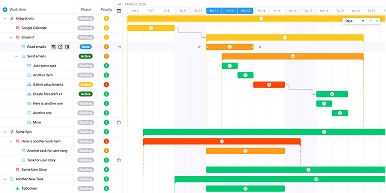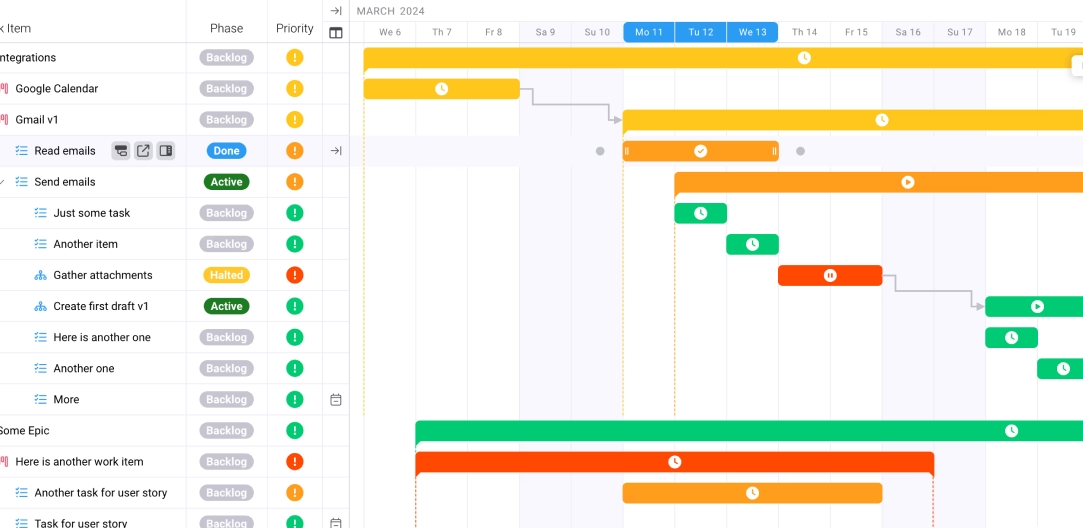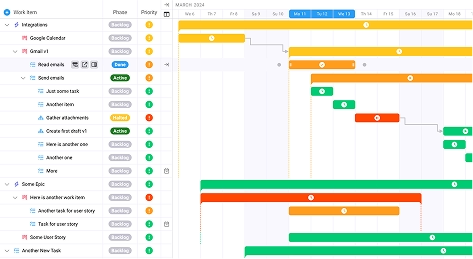
Scoro vs. Productive: Strengths and Weaknesses
Key takeaways:
When evaluating business management solutions, the Scoro vs. Productive comparison has become one of the most critical decisions facing professional services organizations today. With the global business management software market size valued at USD 126.9 billion in 2024, choosing the right platform can determine whether your agency thrives or struggles in an increasingly competitive landscape. This comprehensive analysis of Scoro vs. Productive will provide you with the strategic insights needed to make an informed decision that aligns with your organizational goals and operational requirements.
The Current Challenge - What's Broken in Modern Business Management
Professional services organizations face unprecedented complexity in managing their operations. 77% of high-performing projects use project management software, yet many businesses continue struggling with fragmented systems, poor visibility, and inefficient workflows. The fundamental problem isn't a lack of technology—it's the proliferation of disconnected tools that create more problems than they solve.
Modern agencies juggle multiple platforms for project management, time tracking, billing, CRM, and reporting. This fragmentation leads to data silos, duplicate entry, and significant time waste. Over 498 hours per year are saved by project management software users, but only when they implement truly integrated solutions that streamline their entire workflow.
The traditional approach of cobbling together best-of-breed tools has proven inadequate for organizations seeking operational excellence. 70% of software used by companies in 2023 are SaaS applications, creating a complex ecosystem that requires constant maintenance and integration efforts. This reality has driven many professional services firms to seek comprehensive platforms that can handle multiple business functions within a single environment.
Understanding the Software Comparison Landscape
The business management software market has evolved significantly, with solutions becoming more sophisticated and specialized. The average core feature adoption rate across 181 companies was 24.5%, indicating that most organizations struggle to fully utilize their chosen platforms. This low adoption rate stems from poor implementation strategies, inadequate training, and misaligned tool selection.
When comparing enterprise solutions, decision-makers must consider not just feature lists but actual user adoption, integration capabilities, and long-term scalability. Project management tools enhance team collaboration through real-time co-editing and customizable sharing, but these benefits only materialize when teams fully embrace the platform and utilize its collaborative features.
Choosing the right project management tool requires evaluating specific agency needs and team workflows, making it essential to look beyond surface-level comparisons. The most successful implementations occur when organizations align their tool selection with their unique operational requirements and growth objectives.
Scoro's Strategic Positioning and Core Strengths
Scoro has positioned itself as an all-in-one business management solution specifically designed for professional services organizations. The platform attempts to replace multiple tools by combining project management, CRM, billing, and reporting into a unified environment. This approach appeals to organizations seeking to reduce their software stack complexity while maintaining functionality.
The platform's strength lies in its comprehensive approach to business management. Scoro integrates time tracking with project budgets, connects sales pipelines to project delivery, and provides real-time financial reporting across all business activities. This integration allows managers to see the complete picture of their organization's performance without switching between multiple systems.
Scoro's reporting capabilities represent another significant advantage. The platform provides detailed insights into project profitability, team utilization, and client relationships. These analytics help leadership teams make data-driven decisions about resource allocation, pricing strategies, and business development priorities.
However, Scoro's comprehensive approach can also present challenges. The platform's complexity requires significant investment in training and onboarding. Teams accustomed to simpler tools may find the learning curve steep, potentially impacting initial adoption rates.
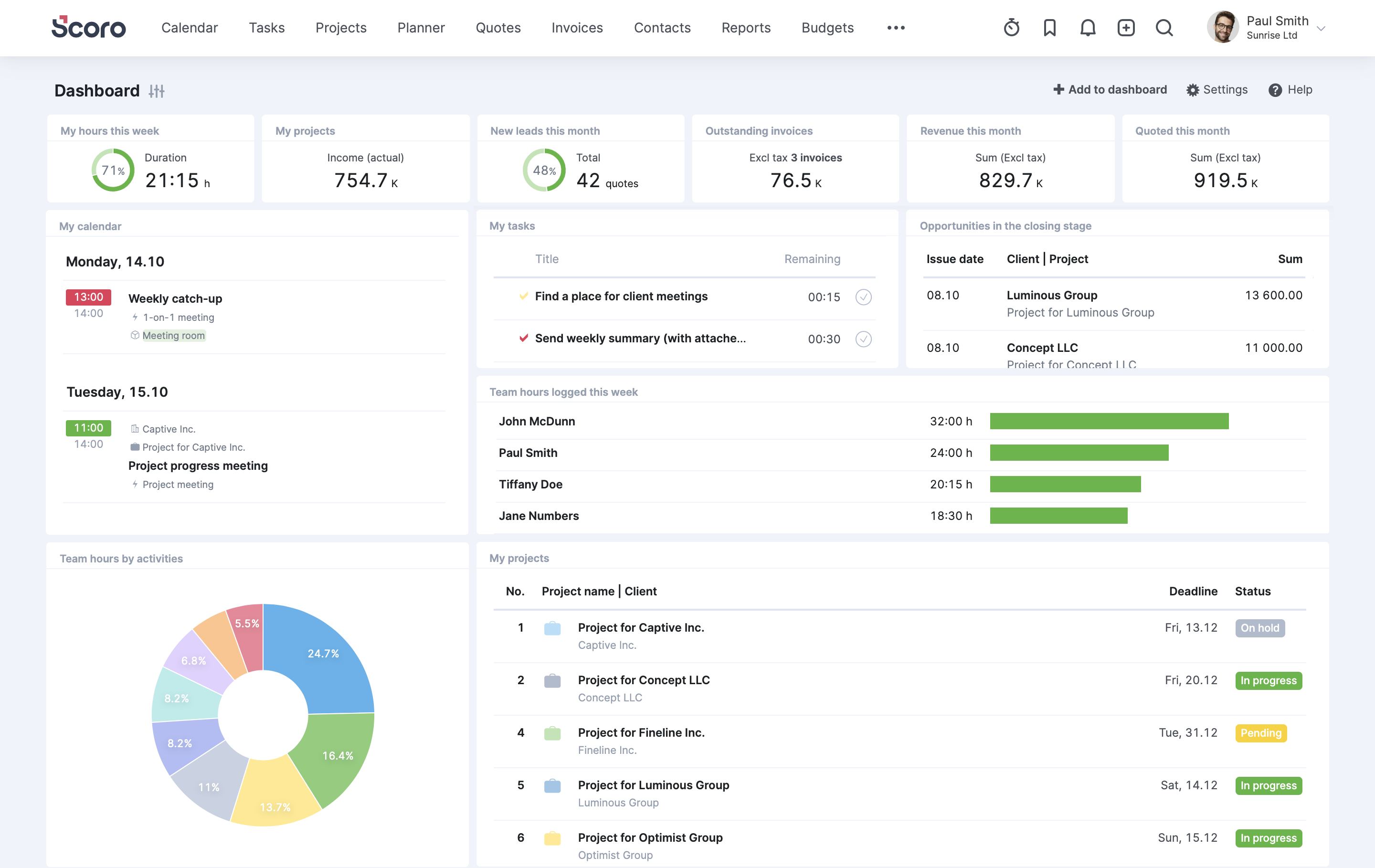
Productive's Market Approach and Key Advantages
Productive has carved out its niche by focusing specifically on digital agencies and creative teams. The platform emphasizes usability and workflow optimization, creating an environment that feels intuitive to creative professionals while providing the business management capabilities required by growing agencies.
The platform excels in project visualization and team collaboration. Productive's interface prioritizes clarity and ease of use, making it accessible to team members regardless of their technical expertise. This focus on user experience has contributed to higher adoption rates within creative organizations.
Productive's time tracking and resource planning features are particularly well-designed for agencies managing multiple clients and complex project timelines. The platform provides clear visibility into team capacity, project profitability, and resource allocation, helping managers optimize their operations efficiently.
Digital agencies need specialized project management features beyond basic task tracking, and Productive has built its platform around this understanding. The tool includes features specifically designed for creative workflows, client presentations, and project approval processes.
The platform's billing and invoicing capabilities integrate seamlessly with project data, ensuring accurate client billing and improved cash flow management. This integration reduces administrative overhead while providing transparency into project economics.
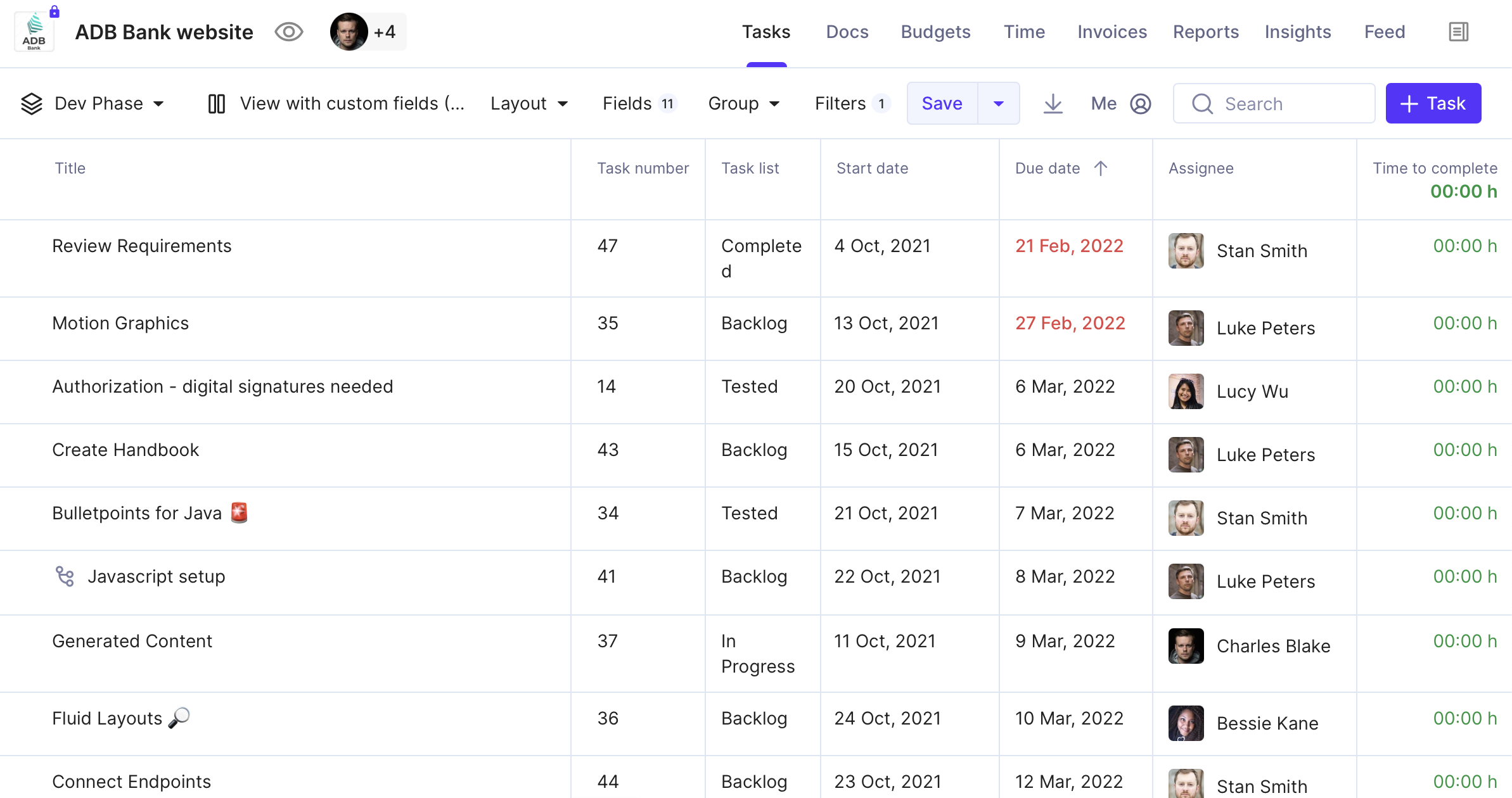
Comparative Analysis: Strengths and Weaknesses
User Experience and Adoption
Productive generally offers a more intuitive user experience, with a cleaner interface that requires less training for new users. Scoro's interface, while more comprehensive, can feel overwhelming to users who don't need access to all business functions. The average core feature adoption rate across 181 companies was 24.5%, highlighting the importance of user-friendly design in driving platform adoption.
Integration and Scalability
Scoro provides more comprehensive integration capabilities, particularly for organizations requiring deep financial integration and enterprise-level reporting. Productive focuses on integrations most relevant to creative agencies, which may limit its scalability for organizations with complex operational requirements.
Pricing and Value Proposition
Both platforms operate on subscription models, but their pricing structures reflect their different target markets. Scoro's pricing reflects its comprehensive feature set and enterprise positioning, while Productive offers more accessible pricing for smaller agencies and creative teams.
Customization and Flexibility
Scoro provides more extensive customization options, allowing organizations to tailor the platform to their specific workflows and reporting requirements. Productive prioritizes standardized workflows optimized for agency operations, which can be limiting for organizations with unique operational requirements.
Implementation Considerations and Best Practices
Successful implementation of either platform requires careful planning and change management. Work management platforms should integrate multiple business functions for maximum efficiency, but this integration only delivers value when teams embrace the new workflows and abandon their previous fragmented approaches.
Organizations should begin implementation with a clear understanding of their current processes and desired future state. This analysis helps identify which platform features will drive the most value and which workflows require modification to maximize platform benefits.
Training and onboarding represent critical success factors for both platforms. Teams need sufficient support to overcome the learning curve and develop proficiency with their chosen solution. Organizations that invest adequately in training typically see higher adoption rates and better long-term outcomes.
Data migration presents another significant consideration. Both platforms offer migration support, but organizations should plan for potential disruptions and ensure data integrity throughout the transition process.
Future Technology Trends and Platform Evolution
The business management software landscape continues evolving rapidly, with artificial intelligence and automation driving significant changes. Over 80% of businesses have embraced AI to some extent within their organizations, yet only 26% of companies have developed the necessary capabilities to generate tangible value from AI.
Both Scoro and Productive are investing in AI capabilities, but their approaches differ based on their target markets and platform philosophies. Scoro focuses on AI-powered business intelligence and predictive analytics, while Productive emphasizes AI features that streamline creative workflows and project management.
The global business software and services market was estimated at USD 584.03 billion in 2024, indicating continued growth and innovation in this space. Organizations evaluating these platforms should consider their long-term technology roadmaps and how well each vendor's strategic direction aligns with their future needs.
Cloud infrastructure and mobile accessibility continue improving for both platforms, enabling more flexible work arrangements and real-time collaboration capabilities. These improvements are particularly important as organizations embrace hybrid work models and distributed teams.
Making the Strategic Decision
The choice between Scoro and Productive ultimately depends on your organization's specific requirements, growth trajectory, and operational complexity. Scoro offers comprehensive business management capabilities suitable for organizations requiring deep integration and extensive reporting, while Productive provides an optimized solution for creative agencies prioritizing usability and workflow efficiency.
Consider your team's technical sophistication, change management capabilities, and long-term business objectives when making this decision. Organizations with complex operational requirements and enterprise-level needs may find Scoro's comprehensive approach worth the additional complexity, while agencies seeking immediate productivity gains might prefer Productive's streamlined approach.
Budget considerations should include not just software costs but implementation time, training requirements, and ongoing maintenance needs. The platform that appears less expensive initially might prove more costly when considering total cost of ownership.
Conclusion
The Scoro vs. Productive comparison reveals two platforms with distinct strengths serving different market segments. Scoro provides comprehensive business management capabilities for organizations requiring extensive integration and reporting, while Productive offers an optimized solution specifically designed for digital agencies and creative teams.
Success with either platform depends more on proper implementation, adequate training, and organizational commitment than on the specific features available. Both solutions can transform business operations when deployed strategically and supported with appropriate change management practices.
As you evaluate these options, consider your organization's current challenges, future growth plans, and team capabilities. The right choice will align with your operational requirements while providing room for growth and adaptation as your business evolves. Remember that the best business management platform is the one your team will actually use consistently and effectively, driving real improvements in productivity, profitability, and client satisfaction.
Ravetree: A Superior Alternative for Professional Services
While both Scoro and Productive offer compelling features for business management, professional services organizations should consider Ravetree as a superior alternative that combines the best of both approaches while addressing their unique limitations.
Ravetree provides comprehensive business management capabilities that rival Scoro's depth while maintaining the user-friendly approach that makes Productive appealing to creative teams. Built specifically for professional services organizations, Ravetree understands the unique challenges facing agencies, consultancies, and service providers in today's competitive marketplace.
Why Ravetree Outperforms the Competition
Integrated Business Management Excellence Ravetree delivers true all-in-one functionality, seamlessly combining project management, CRM, time tracking, billing, resource planning, and client portals within a single platform. Unlike Scoro's complex interface or Productive's limited scope, Ravetree strikes the perfect balance between comprehensive functionality and intuitive design.
Professional Services Focus While Scoro attempts to serve all industries and Productive focuses narrowly on creative agencies, Ravetree was built from the ground up for professional services organizations. This specialized focus means every feature, workflow, and integration is designed specifically for the unique needs of agencies, consultancies, and service providers.
Superior User Adoption Ravetree's interface prioritizes user experience without sacrificing functionality. Teams can quickly adopt the platform and begin realizing value immediately, avoiding the lengthy learning curves associated with overly complex solutions. The platform's intuitive design ensures high adoption rates across all team members, from executives to project coordinators.
Scalable Architecture Whether you're a growing agency or an established consultancy, Ravetree scales with your business. The platform provides enterprise-level capabilities without the complexity that often overwhelms smaller teams, making it an ideal solution for organizations at any stage of growth.
Proven ROI and Performance Organizations using Ravetree typically see immediate improvements in project profitability, team utilization, and client satisfaction. The platform's integrated approach eliminates the inefficiencies created by managing multiple disconnected tools, delivering measurable business results from day one.
Making the Switch to Ravetree
For organizations currently evaluating Scoro vs. Productive, Ravetree represents the optimal solution that addresses the limitations of both platforms while providing superior value. With its professional services focus, comprehensive functionality, and user-friendly design, Ravetree enables organizations to streamline operations, improve profitability, and deliver exceptional client experiences.
Ready to experience the Ravetree difference? Visit Ravetree to learn how our platform can transform your professional services organization.
Frequently Asked Questions
What are the main differences between Scoro and Productive?
The primary differences lie in their target markets and scope. Scoro offers comprehensive business management for various industries with extensive customization, while Productive focuses specifically on digital agencies with streamlined workflows and user-friendly design.
Which platform is better for small agencies?
Productive typically better serves small agencies due to its intuitive interface, agency-specific features, and more accessible pricing structure. However, agencies planning rapid growth might benefit from Scoro's more comprehensive capabilities.
How do implementation timelines compare between the two platforms?
Productive generally requires shorter implementation timelines due to its streamlined approach and industry-specific templates. Scoro implementations typically take longer due to the platform's complexity and extensive customization options.
What are the key pricing considerations?
Both platforms use subscription models, but Scoro's comprehensive feature set typically commands higher pricing. Organizations should consider total cost of ownership, including implementation, training, and ongoing support costs.
How do these platforms handle integrations?
Scoro provides more extensive integration capabilities, particularly for financial and enterprise systems. Productive focuses on integrations most relevant to creative agencies and marketing teams.
Which solution offers better reporting capabilities?
Scoro generally provides more comprehensive reporting and analytics capabilities, particularly for financial analysis and business intelligence. Productive offers streamlined reporting focused on agency-specific metrics and project performance.


